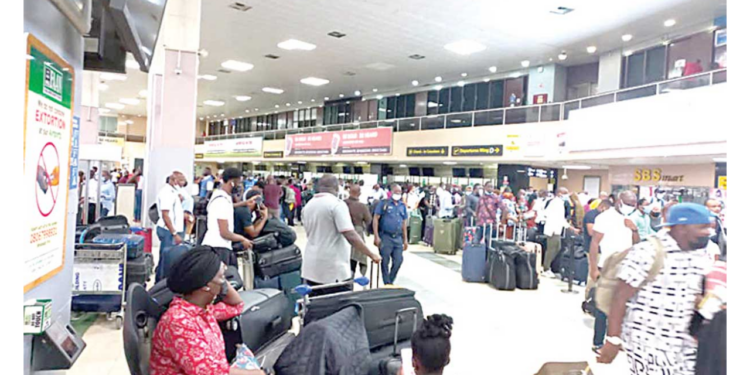A recent survey by Phillips Consulting has shown that over half (52 per cent) of Nigerian professionals are considering leaving their current jobs and moving abroad within a year.
The Talent Management Report, “A New World Order: Shifting Paradigms in Addressing the Brain Drain,” was presented during the quarterly meetup of the Nigerian Human Resources Directors Network in Lagos.
Finance & Insurance, Professional Services, Education, Healthcare, and IT will be the hardest-hit professions. Nearly 50 per cent of employees working in these fields are considering leaving.
According to the report, Nigerian businesses face numerous challenges in the post-pandemic world, such as market uncertainty, inflation, digitisation acceleration, changes in consumer behaviour, increased operational expenses, and complexity. But employee retention and brain drain prevention are today’s most pressing issues.
The rising cost of living is impacting employees’ finances and workplace productivity.
Before the Ukraine crisis, the Nigerian economy faced multiple challenges, including unemployment, a weak currency, and insecurity. The situation has exacerbated the high cost of living and affected employees’ finances and purchasing power.
Research findings show that 90 per cent of Nigerians who have faced an increased cost of living are cutting their spending on essential and non-essential items. This has resulted in financial stress, decreased purchasing power, lower Ejob satisfaction, and higher job mobility and migration rates.
Consequently, employees now channel their efforts toward increasing their revenue streams, improving economic stability, and enhancing their standard of living. To achieve these objectives, many are creating a ‘side hustle,’ finding better-paying jobs, or relocating abroad. As a result, the attrition rate across key sectors has increased significantly.
As labour shortages continue to rise globally, there is intense competition for talent, especially in low-to-middle-skilled occupations. Employees are resigning or migrating for a mix of issues, some of which are within an organisation’s direct control, while others are not.
The findings reveal that Nigerian professionals looking to migrate prefer Canada, the United Kingdom, and the United States as their top three destinations. The reasons for planning to migrate vary, with respondents citing factors such as seeking better-paid jobs, less toxic work cultures, a desire to work from home, and concerns about the country’s economy and insecurity.
According to Phillips Consulting, 88 per cent of individuals who plan to quit their jobs within a year are millennials and Gen Z. This demographic shift could lead to a significant loss of skilled workers, which may negatively affect critical industries and the economy.
Moreover, this demographic includes young professionals with valuable skills and extensive education, making them highly desirable in the global job market.
More than 50 per cent of those surveyed said they would consider cancelling their migration plans if Nigeria met specific conditions.
These conditions include a peaceful environment, better economic conditions, access to competitive and fairly paid job opportunities, and effective leadership.
According to the Phillips Consulting survey report, businesses should review their employee value proposition and talent management strategy to succeed in today’s constantly evolving talent management landscape. This means considering hybrid work arrangements, implementing a fair employee compensation strategy, and providing learning and career development opportunities.
Additionally, employers should re-evaluate their approach to the cost-of-living crisis. Strategic talent management can enhance employee job satisfaction and retention, which is vital for fostering productive and diverse high-performance cultures in companies.
The impact of migration on the Nigerian economy is highly complex. Research demonstrates that the migration of skilled workers from critical sectors can result in a shortage of skilled labour, harming the economy and nation-building. Consequently, the government must create an environment conducive to work by implementing policies that promote security and economic growth.
Furthermore, the government should allocate more resources towards education and areas that enhance social mobility, motivating citizens to stay in the country and positively contribute to their communities.



